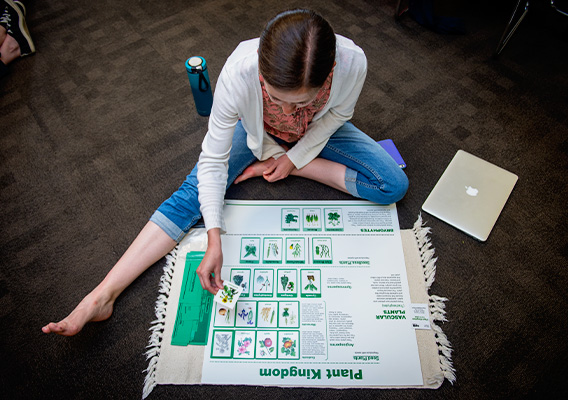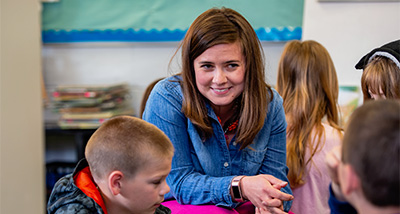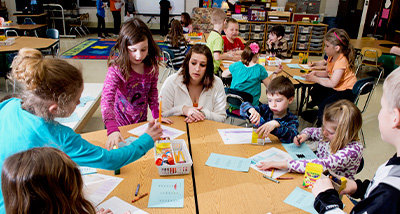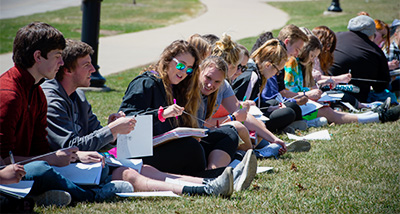
Why Study Montessori Teacher Education?
Graduate | Education | CEBAH
Summer is the ideal time to start your journey to become a credentialed Montessori teacher. Join UWRF’s graduate Montessori Teacher Education program with classes that begin online in mid-June and end mid-August and in person classes spread throughout July and early August. In person classes are held in functioning classrooms at one of our two partner teaching sites: River Falls Public Montessori Elementary School in River Falls, Wis., and Nature’s Classroom Institute in Mukwonago, Wis.
Continue your journey during the academic year with in-person classes one weekend each month and online work throughout the semester. This blended learning format was planned specifically to accommodate people from a broad geographic area who are working full time while they are earning their Montessori credential.
Choose to earn your Montessori credential in Early Childhood (for children ages 3-6), Elementary I (children ages 6-9) or Elementary I-II (children ages 6-12). Early Childhood and Elementary I credentials and Master’s degrees can be completed in six consecutive semesters. Elementary II classes are only offered in the summers and require at least one additional summer. To begin this summer, applications by June 1 are strongly encouraged.
Who is this program designed for?
- K-12 licensed teachers seeking a Montessori credential to teach in private or public Montessori schools.
- Persons with a bachelor's degree seeking a Montessori credential and license to teach in a public Montessori school in Wisconsin.
- Persons with a bachelor's degree seeking Montessori credential to teach in a private Montessori school in states other than Wisconsin.
Please join us for the Celebrating Our Montessori Children Conference 2025 on January 18, 2025 at UWRF!
Program Details
- Earn a Montessori credential for age levels 3-6 (EC), 6-9 (E1) or 6-12 (E2).
- Weekend (academic year) and condensed (summer) format classes complemented by online instruction throughout the semesters.
- Complete the credential and/or Master's degree for Early Childhood or Elementary 1 in six consecutive semesters. Elementary 2 credential requires seven consecutive semesters including three summers.
- Access fully equipped Montessori classrooms.
- No campus fees for classes held off campus.
- Program is MACTE accredited and AMS affiliated for all levels (EC, E1 and E2).
The academic plan will depend on the age level credential and whether or not a master's degree is also sought.
Early Childhood (ages 3-6) Credential, 29 credits
MONT 500 Montessori Philosophy and Pedagogy, 3 cr.
MONT 603 Inclusion in a Montessori Classroom, 3 cr.
MONT 710 Practical Life and Preparation of the Environment, 2 cr.
MONT 711 Montessori Child Observation, 1 cr.
MONT 712 Child Development, 2 cr.
MONT 722 Early Childhood Literacy Foundations, 3 cr.
MONT 732 Early Childhood Social Studies and Science, 3 cr.
MONT 740 Sensorial, 2 cr.
MONT 742 Early Childhood Mathematics, 2 cr.
MONT 752 Early Childhood Music, Movement and the Arts 2 cr.
MONT 762 Early Childhood Leadership and Classroom Management, 2 cr.
MONT 783 Practicum A, 3 cr.
MONT 784 Practicum B, 3 cr.
MONT 791 Montessori Certification Project A, 1 cr.
MONT 792 Montessori Certification Project B, 1 cr.
Add On Master of Science in Education, 3 additional credits
Complete the courses required above then complete the following courses:
MONT 785 Research in Montessori Education, 3 cr.
MONT 793 Final Research Paper, 2 cr. (replaces MONT 791 and MONT 792in Credential curriculum)
Elementary 1 (ages 6-9) Credential, 38-41 credits
MONT 500 Montessori Philosophy and Pedagogy, 3 cr.
MONT 505* Early Childhood Curriculum Overview, 1 cr.
MONT 603 Inclusion in a Montessori Classroom, 3 cr.
MONT 705 Great Lessons, 1 cr.
MONT 711 Montessori Child Observation, 1 cr.
MONT 712 Child Development, 2 cr.
MONT 724 E1 Literacy and Language Arts, 4 cr.
MONT 734 E1 Social Studies, 3 cr.
MONT 735 E1 Science, 3 cr.
MONT 744 E1 Mathematics, 3 cr.
MONT 745 E1 Geometry, 2 cr.
MONT 754 Elementary Music, Movement and Arts, 2 cr.
MONT 763 Elementary Classroom Management, 2 cr.
MONT 764 Elementary Classroom Leadership and Practical Life, 2 cr.
MONT 783 Elementary Practicum A, 3 cr.
MONT 784 Elementary Practicum B, 3 cr.
MONT 791 Montessori Certification Project A, 1 cr
MONT 792 Montessori Certification Project B, 1 cr.
*Required if student does not have Montessori credential in Early Childhood (ages 3-6).
Add On Master of Science in Education, 3 additional credits
Complete the courses required above then complete the following courses:
MONT 785 Research in Montessori Education, 3 cr
MONT 793 Final Research Paper, 2 cr. (replaces MONT 791 and MONT 792in Credential curriculum)
Add On Elementary 2 (ages 6-12) Credential, 15 additional credits
Complete the Elementary 1 courses above unless the applicant is already credentialed to teach ages 6-9 and then complete the following courses:
MONT 726 E2 Language Arts and Literacy, 3 cr.
MONT 736 E2 History and Geography, 3 cr.
MONT 737 E2 Physical Sciences, 2 cr.
MONT 738 E2 Biological Sciences, 2 cr.
MONT 746 E2 Mathematics, 3 cr.
MONT 747 E2 Geometry, 2 cr.
To find current tuition rates, visit the Student Billing website.
Special course fees are assessed for MONT 783 to cover the required AMS/MACTE student membership fees.
Students should also expect to spend $500 to $1,000 in additional expenses for books, teaching albums and supplies.
- An earned baccalaureate degree from an accredited university or college
- An overall undergraduate grade point average of at least 2.75 (on a four-point scale) or an average of at least 2.90 based on the last 64 semester credits (90 quarter credits) of the undergraduate program
- Completed application received with $56 processing fee
- Apply online.
- Pay your application fee.
- Request that official transcripts from the institution where you received your bachelor’s degree, and from any institutions where you earned any subsequent degrees, be sent directly to UW-River Falls Admissions Office via email at graduateadmissions@uwrf.edu.
While students can be admitted to the program any term (summer, fall or spring), the best time to start is summer. This is when new cycles of classes begin and courses flow more efficiently. Students can be admitted in other terms. However, please be aware that some scheduling issues may arise due to prerequisite classes only being offered in the summer.
After admission, you’ll be sent instructions on how to register for classes and other information necessary to begin your course of study.
Administrators or others taking classes for professional development only may apply as a temporary graduate student and the application fee is waived. See Taking Classes for Credit for more information.
The Montessori Teacher Education Program in River Falls is an AMS-affiliated Montessori Teacher Education Program for its Early Childhood and Elementary I-II courses through the year 2020.
American Montessori Society
116 East 16th Street
NY, NY 10003
Phone: 212-358-1250
Fax: 212-358-1256
E-mail: ams@amshq.org
Web: amshq.org
This program is accredited through the Montessori Accreditation Council of Teacher Education (MACTE).
To learn more about our program, including class formats, practicum information, location details, technical support and more, view our Program Guide.
Montessori Teacher Education
montessori@uwrf.edu // 715-425-4758
Your Degree:
Graduate
Area of Study:
Education
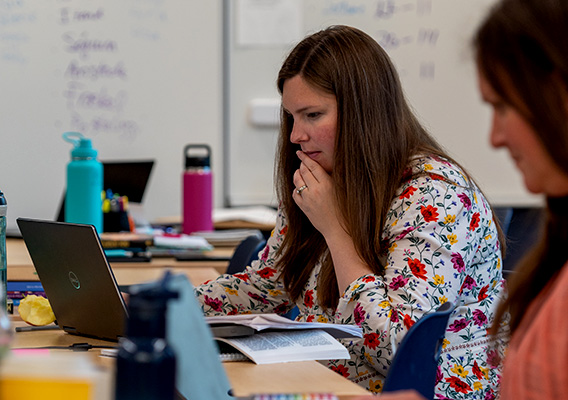
Skills and Learning Outcomes
- Demonstrate proficiency in best practices and implement them in the preparation and development of classroom plans.
- Understand students’ diverse needs and utilize tools to meet needs through instruction.
- Communicate effectively with a range of audiences
- Expand your knowledge of Montessori practices and philosophy and develop tools to more effectively lead
Types of Courses
- Child Development
- Early Childhood Literacy Foundations
- Elementary Classroom Management
- Great Lessons
- Inclusion in a Montessori Classroom
- Montessori Child Observation
- Montessori Philosophy and Pedagogy
- Practical Life and Preparation of the Environment
- Sensorial
